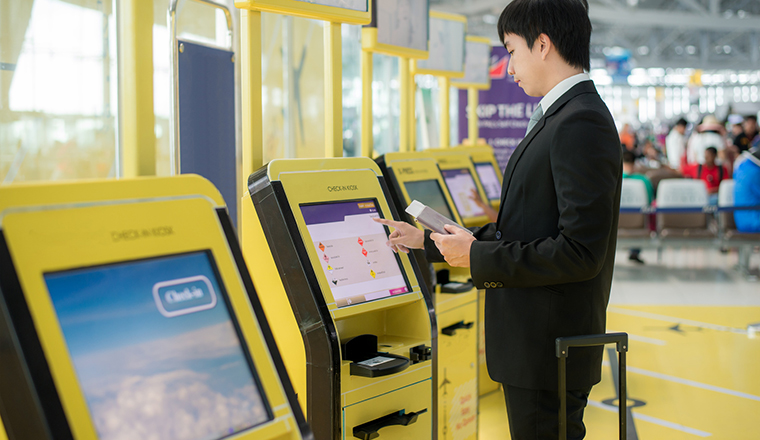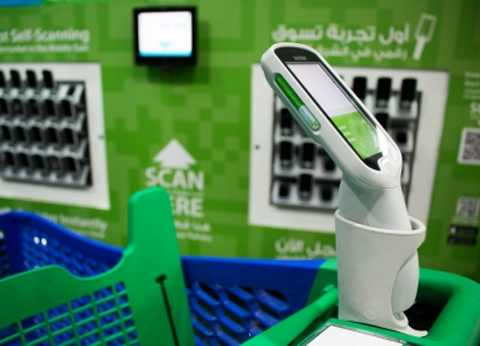EuroCIS 2018: Self-checkouts are getting increasingly common in the retail trade
2017-10-10

Number of outlets with self-checkouts has risen by 50 per cent within two years - Yet Germany is still a developing country for self-checkouts.
The number of retail shops with self-checkout systems has risen by more than 50 per cent in Germany over the last two years. In 2015 the EHI Retail Institute recorded 295 stores with SCO systems, but in mid- 2017 this number then rose to over 450, according to provisional data from a new EHI market survey conducted by the Institute’s Self- Checkout Initiative*. The survey targeted customers, retailers and retail staff. Although, internationally, Germany is still a developing country for self-checkouts, the market has gained considerable momentum recently. Detlef Rohlender, managing director of ITAB Germany, says: “Customers are basically happy to accept SCOs. The level of use and ultimately also sales share are very much impacted by the location of an SCO, its position within the checkout area and the work of service staff giving a helping hand.” And Rohlender adds: “On the positive side, incidentally, we’ve noticed that it is older people, in particular, who like using self-checkout desks. Such facilities are ideal for small purchases, as they put the customer in charge of the check-out speed.”
Today’s steady increase in self-checkout facilities is largely due to the various cooperative groups among food retailers. During the past 24 months the groups that have been especially keen to move ahead with self-checkouts were independent retailers operating under Edeka and Rewe. But chain stores, too, are visibly moving ahead. In one case, more than 50 stores were equipped with the new check-out equipment since the last survey period.
Alongside these novices among food retail chains, there has been some tentative piloting at various chemist stores. Moreover, the market is set to develop positively for mobile self-scanning systems. Although no precise figures are available yet, EHI believes that further installations have been added recently. In mid-2016 the number of stores with mobile payment points was 25. Interestingly, more and more stores are apparently being equipped with both technologies in parallel. Stationary self-checkout points and mobile self-scanning terminals can now be seen side by side at an increasing number of stores.
Christof von Lingen, Toshiba’s Country Sales Leader for Germany, Austria and Switzerland, has the following advice for retailers planning to use SCOs: “The most important thing is not to see such an introduction as an IT project, but to look at shopfittings, organisational issues and HR management from the very beginning.” Detlef Rohlender therefore recommends putting a special focus on the human factor: “Make sure you involve and motivate your workforce right from the start. Pick out an ‘entertainer’ among your staff – someone who encourages a positive attitude among both customers and colleagues. Then you, too, will be successful with SCOs at your outlet.”
Customers are largely positive about it
On the other hand, what hasn’t caught on in Germany yet is mobile self- scanning, using a phone. And initial experience in Switzerland and the United States suggests that this technology is not sufficiently workable yet.It should certainly be interesting to see when the first SCOs will be installed at German discount stores. In other national markets experience has apparently been very positive with SCOs, and it’s quite likely that initial piloting will be conducted in Germany quite soon. The
main reason for this increase in SCOs is no doubt a positive attitudes to this checkout option among customers. Although SCOs are still quite rare in the retail trade, the awareness level and the level of use are reasonably high now. A recent YouGov survey showed that every other German citizen has had some experience with self-scanning checkouts.
A consumer survey conducted by EHI with Kantar TNS in 2014 showed that the level of use was still rather low at the time. Although the awareness level had reached as much as 52 per cent, only just over 20 per cent had actually used SCOs, and about half of all users had done so intensively. The main motivation, according to EHI was potential time savings – a factor described as essential by 90 per cent of respondents.

Important: cash payment facilities
This has also been confirmed by the YouGov study. Around 62 per cent of users said that queues were usually shorter at self-checkout desks, and about 35 per cent perceived the cash payment procedure as faster. As before, self-checkouts are largely suitable for small shopping baskets. Only every fourth user is currently also using self-checkout options for bigger purchases.
It's interesting to look at the social demographics of self-checkout users. Again, the results of the EHI study have been borne out, as self- checkout desks are more widely accepted among relatively young, graduate customers with above-average incomes. Among customers with weekly food store spendings over EUR 90, 55 per cent are positive about using SCOs. By contrast, approval is only 44 per cent among customers spending less than EUR 50 per week at a supermarket.
What hasn’t changed much over the last few years is consumer attitudes to cash payment. 3 out of 4 self-checkout users still prefer to pay in cash. A similar figure was obtained in the first EHI consumer surveys on this topic, so that it continues to be essential for self-checkout desks to be equipped with cash slots. 30 per cent of YouGov respondents said they would make more use of self-checkout points if they could use cash. However, one major obstacle for consumers is still the relatively
rare character of SCOs. “You might say it’s a chicken-and-egg situation in Germany. At the moment SCOs are still quite rare, so customers simply don’t expect to see them (yet)”, says Christof von Lingen.
With around 350 German food stores offering self-service checkouts, their national market share is only just below 1 per cent. In the EHI study 21 per cent of non-users said they would use such checkouts regularly if more of them were provided by retailers. Another 25 per cent said they were happy to try them out if they were given an opportunity. The increase in usage figures suggests that customers have been realising those intentions. If retailers continue to invest in SCOs, then the number of users should rise substantially. So there is still enormous potential for growth over the next few years.
EuroCIS will provide a comprehensive overview of SCO solutions that are currently on the market. Also, a range of presentations will be given at the EuroCIS Forum, showing the direct practical relevance of SCOs. EuroCIS 2018 will be held in Halls 9 and 10 of the Düsseldorf Exhibition Centre and will be open to trade visitors from Tuesday, 27 February until Thursday, 1 March 2018, from 10:00 hrs to 18:00 hrs each day. Day tickets are EUR 30 (EUR 20 online in advance), and two-day tickets are EUR 45 (EUR 35 online in advance). Students and trainees pay EUR
12. Each ticket includes free transport to and from the Düsseldorf Exhibition Centre on local VRR buses, trams and trains. www.eurocis.com
*About the EHI Self-Scanning Initiative:
The Self-Scanning Initiative was founded by the EHI Retail Institute in 2014. Working with well-known manufacturers, the initiative has compiled a comprehensive information package for retailers on this subject. The initiative has documented the available solutions and examples of application in Germany and other countries and has also conducted its own research projects. The latest details of SCO market penetration are due to be published by EHI in early November.
Press contacts:
Dr. Cornelia Jokisch, Tanja Karl (Assistant)
Phone: +49 (0)211 4560-998 or -999, Fax: +49 (0)211 - 4560 8548
Email: JokischC@messe-duesseldorf.de, KarlT@messe-duesseldorf.de















